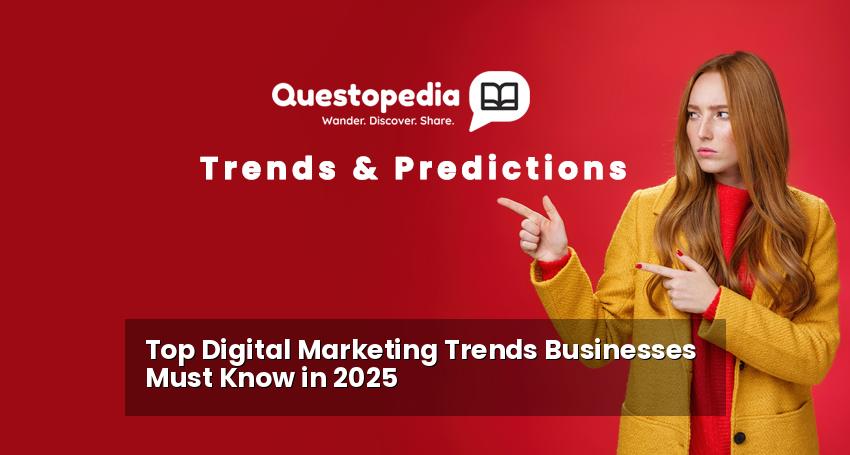Top Digital Marketing Trends Businesses Must Know in 2025
The digital landscape is in constant flux, and businesses that want to thrive in 2025 need to stay ahead of the curve. Understanding and implementing the latest digital marketing trends is crucial for reaching target audiences, boosting brand awareness, and driving conversions. This article will explore the top digital marketing trends businesses must know to succeed in the coming year.
1. The Continued Rise of AI-Powered Marketing
Artificial intelligence (AI) is no longer a futuristic concept; it’s a present-day reality reshaping how businesses approach marketing. In 2025, we can expect to see even more sophisticated AI applications across various marketing functions. Here’s what to look out for:
- AI-Driven Personalization: Moving beyond basic segmentation, AI will enable hyper-personalization of content, offers, and experiences based on individual customer behavior and preferences. This means dynamically tailoring website content, email marketing campaigns, and even product recommendations in real-time.
- Predictive Analytics: AI algorithms will become even better at predicting customer behavior, allowing marketers to anticipate needs and proactively offer relevant solutions. This could involve identifying customers at risk of churn or predicting which products are most likely to appeal to a specific segment.
- AI-Powered Chatbots: Expect to see more sophisticated and human-like chatbots providing instant customer support and guiding users through the sales funnel. These chatbots will be able to handle complex queries and learn from interactions, improving their effectiveness over time.
2. The Metaverse Marketing Frontier
The metaverse, a persistent, shared, 3D virtual world, presents exciting new opportunities for marketers. While still in its early stages, the metaverse is poised to become a significant platform for brands to connect with consumers in immersive and engaging ways. Explore how brands are approaching metaverse.
- Virtual Experiences: Brands can create virtual stores, product showcases, and interactive experiences within the metaverse, allowing customers to explore products and services in a unique and engaging environment. Consider offering exclusive virtual events or behind-the-scenes tours.
- Virtual Advertising: The metaverse offers new advertising opportunities, such as virtual billboards, branded avatars, and in-world sponsorships. Brands can reach a captive audience within these virtual environments.
- NFTs and Digital Collectibles: Non-fungible tokens (NFTs) can be used to create unique digital assets that represent ownership of virtual items, experiences, or even real-world products. Brands can leverage NFTs to build loyalty programs, reward customers, and create exclusive experiences.
3. The Importance of Video Marketing
Video continues to dominate the digital landscape. In 2025, video marketing will become even more essential for capturing attention, engaging audiences, and driving conversions. Learn more about video marketing. Here’s why:
- Short-Form Video Dominance: Platforms like TikTok and Instagram Reels have demonstrated the power of short-form video. Businesses need to create engaging, bite-sized video content that captures attention quickly.
- Live Video Streaming: Live video remains a powerful tool for connecting with audiences in real-time. Brands can use live video for product demos, Q&A sessions, and behind-the-scenes glimpses into their operations.
- Interactive Video: Interactive video allows viewers to engage with the content, creating a more immersive and personalized experience. This can involve adding clickable buttons, quizzes, or polls within the video.
4. Enhanced Focus on Customer Experience (CX)
In 2025, providing exceptional customer experiences will be more critical than ever. Customers expect seamless, personalized, and convenient interactions with brands across all channels. Businesses that prioritize CX will be more likely to attract and retain loyal customers. To further elevate your understanding, consider exploring insights from the top trends in customer experience.
- Omnichannel Marketing: Creating a seamless customer experience across all touchpoints, including website, social media, email, and mobile apps, is essential. Ensure that customers can easily transition between channels without losing context.
- Personalized Customer Service: Providing personalized customer support through live chat, email, and phone is crucial for resolving issues quickly and efficiently. Empower customer service agents to go the extra mile to exceed customer expectations.
- Data-Driven Optimization: Use data analytics to understand customer behavior and identify areas for improvement in the customer journey. Continuously test and optimize your CX to ensure that it meets customer needs.
5. The Power of Voice Search and Smart Speakers
Voice search is becoming increasingly popular, driven by the rise of smart speakers and voice assistants like Siri and Alexa. Businesses need to optimize their content for voice search to capture this growing audience. You can use keywords to optimize for voice search.
- Optimizing for Conversational Search: Voice searches tend to be longer and more conversational than traditional text searches. Focus on optimizing your content for natural language queries.
- Claiming and Optimizing Local Listings: Voice search is often used for local searches, such as “restaurants near me.” Ensure that your business listings are accurate and up-to-date on Google My Business and other local directories.
- Creating Voice-Friendly Content: Develop content that is easily understood when read aloud by a voice assistant. This may involve using shorter sentences and simpler vocabulary.
6. Sustainability and Ethical Marketing
Consumers are increasingly concerned about sustainability and ethical business practices. In 2025, businesses that demonstrate a commitment to social and environmental responsibility will be more likely to attract and retain customers. Consider exploring more about ethical marketing.
- Transparency and Authenticity: Be transparent about your sustainability efforts and ethical sourcing practices. Avoid greenwashing or making misleading claims about your environmental impact.
- Supporting Social Causes: Partner with non-profit organizations or support social causes that align with your brand values. Demonstrate a genuine commitment to making a positive impact on the world.
- Eco-Friendly Marketing Materials: Use eco-friendly marketing materials, such as recycled paper and biodegradable packaging. Reduce your environmental footprint by minimizing waste and energy consumption.
Conclusion
The digital marketing landscape is constantly evolving, and businesses that want to succeed in 2025 must be willing to adapt and embrace new trends. By focusing on AI-powered marketing, the metaverse, video marketing, customer experience, voice search, and sustainability, businesses can position themselves for growth and success in the years to come. Remember to continuously analyze your results, adapt your strategies, and stay informed about the latest developments in the digital marketing world. Visit Questopedia for more insights and resources.






